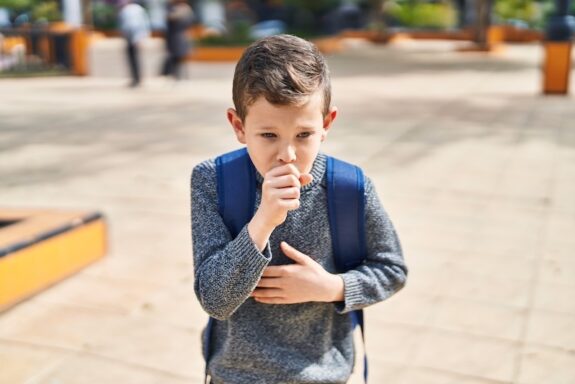What is a cough?
A cough is a common symptom of illness. Although coughs often sound bad, keep in mind that coughing is a good reflex that clears out the airways in the lungs and protects your child from getting pneumonia.
Your child may have a dry and hacking type of cough. Or your child may have a wet cough and cough up a lot of mucus. When your child continuously coughs for more than 5 minutes, it is called a coughing spasm.
What is the cause?
Most coughs are caused by a viral infection. An infection of the trachea (windpipe) is called tracheitis. An infection of the bronchi (larger air passages in the lungs) is called bronchitis. Most children get such a viral infection a couple of times a year as part of a cold. These infections are usually not serious.
How long will it last?
Usually bronchitis causes a dry tickly cough that lasts 2 to 3 weeks. Sometimes the cough becomes loose (wet) for a few days, and your child coughs up a lot of phlegm (mucus). This is usually a sign that the end of the illness is near.
How can I take care of my child?
- Cough drops: Most coughs in children over age 6 years can be controlled by sucking on cough drops. The cough drops coat the irritated throat. If cough drops are not available, you can use hard candy.
- Homemade cough syrup: For children over 1 year old use 1/2 to 1 teaspoon of honey. The honey thins the secretions and loosens the cough. A recent study showed it was more effective at reducing coughing than OTC cough syrup containing dextromethorphan (DM).
- Warm liquids for coughing spasms: Warm liquids usually relax the airway and loosen up the mucus. Start with warm lemonade, warm apple juice, or warm herbal tea. (Avoid this if your child is less than 4 months old.)
- Cough medicines are not as helpful as honey. They should not be given to children under 4 years old because they can cause serious side effects. In general, you should not give these medicines to children. Coughing helps protect the lungs by clearing out germs.
- Encourage your child to drink adequate fluids to prevent dehydration. This will also loosen the phlegm in the airway.
- Dry air tends to make coughs worse. Use a humidifier in your child’s bedroom if your home is dry.
- Gym and exercise may trigger coughing spasms when children have bronchitis. If so, they should avoid such physical activity temporarily.
- Don’t let anyone smoke around your child.
- Antihistamines, decongestants, and fever medicines are found in many cough syrups. There is no proof that these ingredients will help your child’s cough, and the antihistamines may make your child sleepy. Expectorants are of unproven value but harmless. Cough and cold medicines should never be given to children under 4 years of age. Stay with the simple home remedies mentioned above or talk with your provider.
- Milk does not need to be eliminated from the diet. Restricting it improves the cough only if your child is allergic to milk.
- Never stop breast-feeding because of a cough.
When should I call my child’s healthcare provider?
Call IMMEDIATELY if:
- Breathing becomes fast or labored (when your child is not coughing).
- Your child starts acting very sick.
Call during office hours if:
- A fever lasts more than 3 days.
- The cough lasts more than 3 weeks.
- You have other concerns or questions.
Disclaimer
Written by Barton D. Schmitt, MD, author of “My Child Is Sick”, American Academy of Pediatrics Books.
Pediatric Advisor 2012.1 published by RelayHealth.
Last modified: 2010-06-03 Last reviewed: 2011-06-06
This content is reviewed periodically and is subject to change as new health information becomes available. The information is intended to inform and educate and is not a replacement for medical evaluation, advice, diagnosis or treatment by a healthcare professional.
© 2012 RelayHealth and/or its affiliates. All rights reserved.
Merck does not endorse and is not responsible for the accuracy of the content, or for practices or standards of non-Merck sources. Please read our Terms of Use for more information.
Copyright © 2012 Merck Sharp & Dohme Corp., a subsidiary of Merck & Co. Inc. All rights reserved.
The Lancet® is a registered trademark of Elsevier Properties S.A. used under license.



